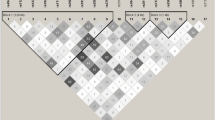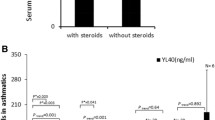Abstract
Asthma is a complex disease for which genetic predisposition has been widely documented. Considerable evidence supports the hypothesis that polymorphisms in the muscarinic–cholinergic (CHRM) genes could be involved in asthma pathogenesis, bronchial hyperresponsiveness, and mucus secretion. To determine whether single nucleotide polymorphisms (SNPs) or haplotypes in CHRM1, CHRM2, or CHRM3 are associated with asthma in Mexican pediatric population. We performed a case–control study including 398 pediatric cases with asthma and 450 healthy controls. We analyzed 19 SNPs distributed among these three genes. Two of the seven SNPs located in CHRM2, the 3′ untranslated region rs8191992 and rs6962027, differed significantly in allele frequencies between patients with asthma and healthy controls [odds ratio (OR) 1.42, 95 % confidence interval (95 % CI) 1.14–1.77, P = 0.001, and OR 1.50, 95 % CI 1.21–1.87, P = 0.0002, respectively]. Statistical significance remained after multiple comparison corrections (P = 0.003 and P = 0.005, respectively). The haplotypes AA and TT, containing both major and minor alleles from rs8191992 and rs6962027, also differed between cases and controls. The haplotype AA occurred at a lower frequency in cases (OR 0.67, 95 % CI 0.53–0.85, P = 0.001) whereas the haplotype TT was overrepresented in cases compared to controls (28 vs 21 %, respectively; OR 1.46, 95 % CI 1.15–1.85, P = 0.002). No association was observed between CHRM1 or CHRM3 SNPs or haplotypes and asthma. CHRM2 polymorphisms are implicated in the genetic etiology of asthma.

Similar content being viewed by others
References
Lemanske RF Jr, Busse WW (2003) Asthma. J Allergy Clin Immunol 111:S502–S519
Buels KS, Fryer AD (2012) Muscarinic receptor antagonists: effects on pulmonary function. Handb Exp Pharmacol 208:317–341
Meurs H, Dekkers BG, Maarsingh H, Halayko AJ, Zaagsma J, Gosens R (2013) Muscarinic receptors on airway mesenchymal cells: novel findings for an ancient target. Pulm Pharmacol Ther 26:145–155
Struckmann N, Schwering S, Wiegand S et al (2003) Role of muscarinic receptor subtypes in the constriction of peripheral airways: studies on receptor-deficient mice. Mol Pharmacol 64:1444–1451
Salgado H, Bellay T, Nichols JA et al (2007) Muscarinic M2 and M1 receptors reduce GABA release by Ca2+ channel modulation through activation of PI3 K/Ca2+-independent and PLC/Ca2+-dependent PKC. J Neurophysiol 98:952–965
Oenema TA, Kolahian S, Nanninga JE et al (2010) Pro-inflammatory mechanisms of muscarinic receptor stimulation in airway smooth muscle. Respir Res 11:130
Jacoby DB, Yost BL, Kumaravel B et al (2001) Glucocorticoid treatment increases inhibitory m(2) muscarinic receptor expression and function in the airways. Am J Respir Cell Mol Biol 24:485–491
Belmonte KE (2005) Cholinergic pathways in the lungs and anticholinergic therapy for chronic obstructive pulmonary disease. Proc Am Thorac Soc 2:297–304
Gosens R, Zaagsma J, Meurs H, Halayko AJ (2006) Muscarinic receptor signaling in the pathophysiology of asthma and COPD. Respir Res 7:73
Ikeda T, Anisuzzaman AS, Yoshiki H et al (2012) Regional quantification of muscarinic acetylcholine receptors and β-adrenoceptors in human airways. Br J Pharmacol 166:1804–1814
On LS, Boonyongsunchai P, Webb S, Davies L, Calverley PM, Costello RW (2001) Function of pulmonary neuronal M(2) muscarinic receptors in stable chronic obstructive pulmonary disease. Am J Respir Crit Care Med 163:1320–1325
Cao R, Dong XW, Jiang JX et al (2011) M(3) muscarinic receptor antagonist bencycloquidium bromide attenuates allergic airway inflammation, hyperresponsiveness and remodeling in mice. Eur J Pharmacol 655:83–90
Donfack J, Kogut P, Forsythe S, Solway J, Ober C (2003) Sequence variation in the promoter region of the cholinergic receptor muscarinic 3 gene and asthma and atopy. J Allergy Clin Immunol 111:527–532
Fenech AG, Ebejer MJ, Felice AE, Ellul-Micallef R, Hall IP (2001) Mutation screening of the muscarinic M(2) and M(3) receptor genes in normal and asthmatic subjects. Br J Pharmacol 133:43–48
Maeda Y, Hizawa N, Jinushi E et al (2006) Polymorphisms in the muscarinic receptor 1 gene confer susceptibility to asthma in Japanese subjects. Am J Respir Crit Care Med 174:1119–1124
Szczepankiewicz A, Breborowicz A, Sobkowiak P, Kramer L, Popiel A (2009) Association of A/T polymorphism of the CHRM2 gene with bronchodilator response to ipratropium bromide in asthmatic children. Pneumonol Alergol Pol 77:5–10
Yamamoto T, Yamashita N, Kuwabara M et al (2002) Mutation screening of the muscarinic M2 and M3 receptor genes in asthmatics, outgrow subjects, and normal controls. Ann Genet 45:109–113
Jiménez-Morales S, Gamboa-Becerra R, Baca V et al (2012) MiR-146a polymorphism is associated with asthma but not with systemic lupus erythematosus and juvenile rheumatoid arthritis in Mexican patients. Tissue Antigens 80:317–321
Ramírez-Bello J, Jiménez-Morales S, Espinosa-Rosales F et al (2013) Juvenile rheumatoid arthritis and asthma, but not childhood-onset systemic lupus erythematosus are associated with FCRL3 polymorphisms in Mexicans. Mol Immunol 53:374–378
Luo X, Kranzler HR, Zuo L, Wang S, Blumberg HP, Gelernter J (2005) CHRM2 gene predisposes to alcohol dependence, drug dependence and affective disorders: results from an extended case-control structured association study. Hum Mol Genet 14:2421–2434
Wang JC, Hinrichs AL, Stock H et al (2004) Evidence of common and specific genetic effects: association of the muscarinic acetylcholine receptor M2 (CHRM2) gene with alcohol dependence and major depressive syndrome. Hum Mol Genet 13:1903–1911
Barrett JC, Fry B, Maller J, Daly MJ (2005) Haploview: analysis and visualization of LD and haplotype maps. Bioinformatics 21:263–265
Del Rio-Navarro B, Del Rio-Chivardi JM, Berber A, Sienra-Monje JJ, Rosas-Vargas M, Baeza-Bacab M (2006) Asthma prevalence in children living in North Mexico City and a comparison with other Latin American cities and world regions. Allergy Asthma Proc 27:334–340
Liu J, Conklin BR, Blin N, Yun J, Wess J (1995) Identification of a receptor/G-protein contact site critical for signaling specificity and G-protein activation. Proc Natl Acad Sci USA 92:11642–11646
Vogel WK, Sheehan DM, Schimerlik MI (1997) Site-directed mutagenesis on the m2 muscarinic acetylcholine receptor: the significance of Tyr403 in the binding of agonists and functional coupling. Mol Pharmacol 52:1087–1094
Yuan HY, Chiou JJ, Tseng WH et al (2006) FASTSNP: an always up-to-date and extendable service for SNP function analysis and prioritization. Nucleic Acids Res 34:W635–W641
Bowerfind WM, Fryer AD, Jacoby DB (2002) Double-stranded RNA causes airway hyperreactivity and neuronal M2 muscarinic receptor dysfunction. J Appl Physiol 92:1417–1422
Moulton BC, Fryer AD (2011) Muscarinic receptor antagonists, from folklore to pharmacology; finding drugs that actually work in asthma and COPD. Br J Pharmacol 163:44–52
Ogoda M, Niiya R, Koshika T, Yamada S (2001) Comparative characterization of lung muscarinic receptor binding after intratracheal administration of tiotropium, ipratropium, and glycopyrrolate. J Pharmacol Sci 115:374–382
Pelaia G, Vatrella A, Gallelli L, Cazzola M, Maselli R, Marsico SA (2004) Potential genetic influences on the response to asthma treatment. Pulm Pharmacol Ther 17:253–261
Mougey EB, Chen C, Tantisira KG, Blake KV, Peters SP, Wise RA, Weiss ST, Lima JJ (2013) Pharmacogenetics of asthma controller treatment. Pharmacogenomics J 13:242–250
Guo Y, Traurig M, Ma L et al (2006) CHRM3 gene variation is associated with decreased acute insulin secretion and increased risk for early-onset type 2 diabetes in Pima Indians. Diabetes 55:3625–3629
Garbacki N, Di Valentin E, Huynh-Thu VA et al (2011) MicroRNAs profiling in murine models of acute and chronic asthma: a relationship with mRNAs targets. PLoS One 6:e16509
Bartel DP (2004) MicroRNAs: genomics, biogenesis, mechanism, and function. Cell 116:281–297
Ricci A, Mariotta S, Amenta F, Tayebati SK, Terzano C (2008) Changes in muscarinic cholinergic receptor expression in human peripheral blood lymphocytes in allergic rhinitis patients. Pulm Pharmacol Ther 21:79–87
Larché M, Robinson DS, Kay AB (2003) The role of T lymphocytes in the pathogenesis of asthma. J Allergy Clin Immunol 111:450–463
Kharitonov SA, Barnes PJ (2006) Exhaled biomarkers. Chest 130:1541–1546
Paraskakis E, Brindicci C, Fleming L et al (2006) Measurement of bronchial and alveolar nitric oxide production in normal children and children with asthma. Am J Respir Crit Care Med 174:260–267
Liu J, Blin N, Conklin BR, Wess J (1996) Molecular mechanisms involved in muscarinic acetylcholine receptor-mediated G protein activation studied by insertion mutagenesis. J Biol Chem 271:6172–6178
ten Berge RE, Santing RE, Hamstra JJ, Roffel AF, Zaagsma J (1995) Dysfunction of muscarinic M2 receptors after the early allergic reaction: possible contribution to bronchial hyperresponsiveness in allergic guinea-pigs. Br J Pharmacol 114:881–887
Cohen-Woods S, Gaysina D, Craddock N, Farmer A et al (2009) Depression case control (DeCC) study fails to support involvement of the muscarinic acetylcholine receptor M2 (CHRM2) gene in recurrent major depressive disorder. Hum Mol Genet 18:1504–1509
Mobascher A, Rujescu D, Mittelstrass K et al (2010) Association of a variant in the muscarinic acetylcholine receptor 2 gene (CHRM2) with nicotine addiction. Am J Med Genet B 153B:684–690
Cannon DM, Klaver JK, Gandhi SK et al (2011) Genetic variation in cholinergic muscarinic-2 receptor gene modulates M2 receptor binding in vivo and accounts for reduced binding in bipolar disorder. Mol Psychiatry 16:407–418
Jung MH, Park BL, Lee BC et al (2011) Association of CHRM2 polymorphisms with severity of alcohol dependence. Genes Brain Behav 10:253–256
Mak JC, Baraniuk JN, Barnes PJ (1992) Localization of muscarinic receptor subtype mRNAs in human lung. Am J Respir Cell Mol Biol 7:344–348
Lucas JL, DeYoung JA, Sadee W (2001) Single nucleotide polymorphisms of the human M1 muscarinic acetylcholine receptor gene. AAPS PharmSci 3:E31
Acknowledgments
This study was supported by a grant from Consejo Nacional de Ciencia y Tecnología, Mexico (CONACyT): SALUD-008-2011-C01-161936. Authors would like to thanks all patients and families for their participation.
Conflict of interest
The authors declare no conflicts of interest.
Author information
Authors and Affiliations
Corresponding author
Rights and permissions
About this article
Cite this article
Jiménez-Morales, S., Jiménez-Ruíz, J.L., Del Río-Navarro, B.E. et al. CHRM2 but not CHRM1 or CHRM3 polymorphisms are associated with asthma susceptibility in Mexican patients. Mol Biol Rep 41, 2109–2117 (2014). https://doi.org/10.1007/s11033-014-3060-6
Received:
Accepted:
Published:
Issue Date:
DOI: https://doi.org/10.1007/s11033-014-3060-6




